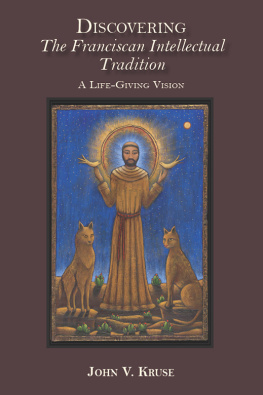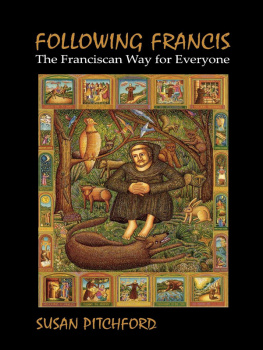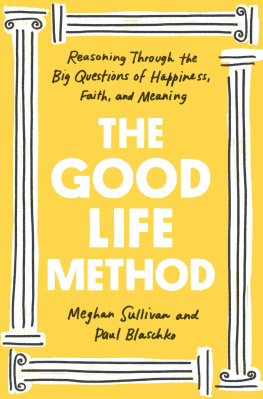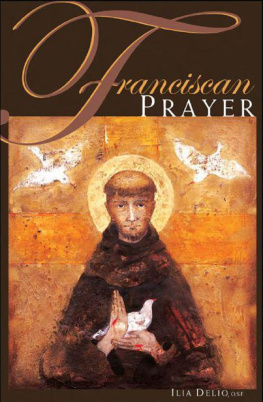
DISCOVERING THE FRANCISCAN
INTELLECTUAL TRADITION:
A LIFE-GIVING VISION
JOHN V. KRUSE
Published in the United States
by Franciscan Institute Publications
St. Bonaventure University, St. Bonaventure, NY 14778
2017 Franciscan Institute Publications,
St. Bonaventure University
All rights reserved.
No part of this book may be reproduced or transmitted in any form or by any means,
electronic or mechanical, without permission in writing from the publisher.
Cover Image St. Francis in the Desert Night
Jane Cassidy, Indigo Gallery
Jane Cassidys paintings can be viewed online at www.janecassidystudio.com
and at Indigo Gallery, Madrid, New Mexico
Cover design by Jill M. Smith
ISBN: 978-1-57659-416-2
eISBN: 978-1-57659-417-9
Library of Congress Cataloging-in-Publication Data
Names: Kruse, John V., author.
Title: Introducing the Franciscan intellectual tradition : origins, essentials, and importance / John V. Kruse.
Description: St. Bonaventure : Franicscan Institute Publications, 2017.
Identifiers: LCCN 2017015509 | ISBN 9781576594162 (pbk. : alk. paper)
Subjects: LCSH: Franciscans--History. | Franciscans--Intellectual life.
Classification: LCC BX3606.3 .K78 2017 | DDC 271/.3--dc23 LC record available at https://lccn.loc.gov/2017015509
Printed and bound in the United States of America
Franciscan Institute Publications makes every effort
to use environmentally responsible suppliers and materials
in the publishing of its books. This book is printed on acid-free, recycled paper that is
FSC (Forest Stewardship Council) certified.
It is printed with soy-based ink.
TABLE OF CONTENTS
Introduction:
Asking Questions of Ultimate Human Concern
Chapter 1
Foundations of a Tradition: The Lives of Francis and Clare
Chapter 2
A Tradition Develops: Main Figures and Key Characteristics
Chapter 3
So What?: Why the Franciscan Intellectual Tradition Matters
Gratitude is owed to many who have served as an inspiration for this book and who have helped to make its publication possible. I am eternally grateful to Fr. J. Wayne Hellmann, OFM Conv., for first introducing me to the Franciscan Intellectual Tradition. I extend thanks to the Sisters of Saint Francis of Philadelphia, who sponsor Neumann University and serve as living witnesses to the richness of the Tradition. Thanks also to Fr. John Cella, OFM, Director of Franciscan Pilgrimage Programs, for the opportunity to encounter the sacred sites of Francis and Clare, an encounter which has deeply impacted my understanding of the Franciscan Intellectual Tradition and of its relevance in the modern world. I am very much indebted to Fr. Dominic Monti, OFM, and Br. F. Edward Coughlin, OFM, for their insightful feedback and suggestions as they reviewed early drafts of this work. This project would not have come to fruition without the support of the Commission of the Franciscan Intellectual Tradition (CFIT) and the efforts of both Fr. David Couturier, OFM Cap., and Ms. Jill Smith of Franciscan Institute Publications. Lastly, I extend special gratitude to Sr. Kathleen Moffat, OSF, not only for her editorial insights and design work but most importantly for her guiding inspiration and encouragement during the writing process.
Please note that within this publication, footnotes are
identified with Arabic Numerals, while endnotes are
identified with Roman Numerals.
INTRODUCTION: ASKING QUESTIONS
OF ULTIMATE HUMAN CONCERN
Why am I on this planet? How do I lead a meaningful and purposeful life?
These might seem like strange questions to ask at the beginning of a book exploring the Franciscan Intellectual Tradition. In fact, however, these questions are not irrelevant to the Franciscan Intellectual Tradition. You may have asked yourself these or other similar big questions of life: What happens when we die? Is there a God? If so, how do I find God? What makes something good and something else bad? Why do good people suffer?
Humans have been asking these types of questions since humans have existed. In fact, asking these questions of ultimate concern is part of what makes us human. Throughout time, different people have approached these issues differently and come to their own conclusions. Furthermore, people from all different backgrounds continue to wrestle with these important life issues. Many people today are finding that different contemporary worldviews are not offering satisfactory answers to questions of ultimate meaning. In this book, we will examine how the particular approach called the Franciscan Intellectual Tradition has engaged questions of ultimate human concern. This Franciscan Intellectual Tradition is the framework used by those who have been influenced by the life of St. Francis of Assisi (1181-1226) as they have wrestled with the big questions of life. This book will offer a fuller description of the Franciscan Intellectual Tradition as we proceed.
How could the life of Francis, someone who lived 800 years ago, be relevant to our own lives? In , we will discover the relevancy of the Franciscan Intellectual Tradition by exploring the life-giving insights that it provides into questions of ultimate human concern.
We turn now to the lives of Francis and Clare, the inspiration of the Franciscan Intellectual Tradition, whose world bore many similarities to our own and who wrestled with many of the same issues we continue to wrestle with today.
QUESTIONS FOR REFLECTION AND DISCUSSION:
What do you know about the life of St. Francis?
What do you consider to be the two most important questions of life?
Where do you look for answers to the most important questions of life?
_____________________________
Spirituality relates to how one understands and expresses ones spiritual life.
CHAPTER 1 FOUNDATIONS OF A TRADITION:
THE LIVES OF FRANCIS AND CLARE
You may have heard of St. Francis, you may have seen a statue of him in a garden, and you may have asked yourself what this saint often associated with animals who lived hundreds of years ago could possibly have to do with your own life. This is an important question to ask. In some senses, the world of Francis and his friend Clare was very different from our own. Clearly, the world has changed considerably in 800 years. Yet, in other ways, the world of Francis and Clare was quite similar to our own. Francis and Clare lived in a time in which society was going through substantial changes. Their world was plagued by wars resulting from class tensions, political struggles, and even religious differences. Furthermore, Francis and Clare lived in a world that expected them to fit into certain categories and to fulfill certain preconceived roles without making too many waves within the way things were.
THE LIVES OF FRANCIS AND CLARE
In order to understand the Franciscan Intellectual Tradition (FIT), we have to know about the lives of Francis and Clare, the lives on which the FIT is based. Francis was born in 1181 in Assisi, a small city in central Italy.
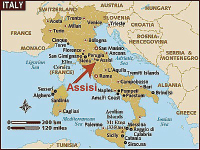
Prior to this period, there were basically two social classes: the landowning nobility (the majores) and the working lower class (the minores). Around the time of Francis, a new social class was beginning to emerge from within the

